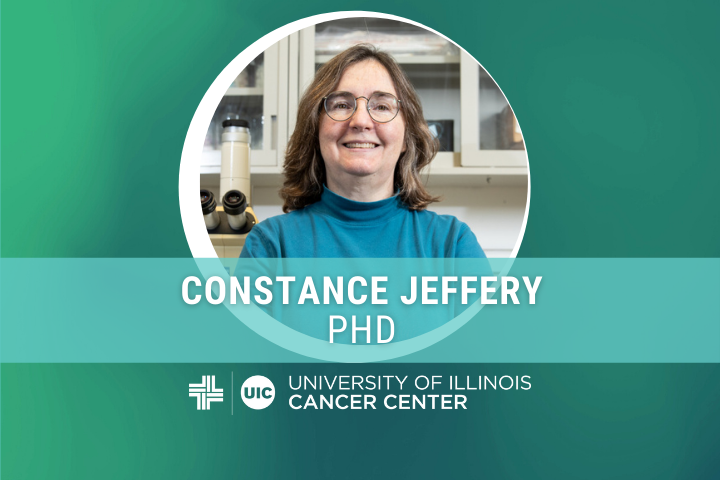
University of Illinois Cancer Center member Constance Jeffery has been named a Fellow by the American Association for the Advancement of Science (AAAS).
Jeffery, associate professor of biological sciences at the University of Illinois Chicago and member of the Cancer Center’s Cancer Biology program, was honored in the medical sciences discipline for pioneering contributions to the understanding of multifunctional proteins and outstanding contributions to the training and mentoring of junior scientists.
In her work, Jeffery uses methods from biochemistry, biophysics, and computer analytics to understand how the changes in protein sequences can lead to diseases such as cancer or IBD (inflammatory bowel disease, ulcerative colitis and Crohn’s disease). Her laboratory is also heavily involved in “moonlighting” proteins, a term she coined in a Trends in Biochemistry article that has been cited more than 1,200 times. The expression refers to how one polypeptide chain can perform two or more physiologically relevant biochemical or biophysical functions.
“Elucidating these different aspects of protein structure, function and regulation can lead to a better understanding of how the many diverse processes in the cell are coordinated in health and also what goes wrong in disease,” Jeffery said. “It is important for basic science, such as the prediction of functions for the millions of proteins being discovered by genome sequencing projects, and it is also important for medicine, including the development of novel diagnostics and therapeutics for cancer.”
Jeffery is not only a renowned researcher – she has been successful in securing funding from organizations such as the National Science Foundation, the American Heart Association, Women in Bio, and the American Cancer Society Illinois Division – but also a scientist who teaches and mentors the next generation of researchers.
Each year Jeffery teaches biochemistry to about 800 UIC undergraduate students. When time permits, she develops research experiences for several undergraduate students who may not be given the opportunity elsewhere. During the summer of 2020, when the COVID-19 pandemic closed many laboratories, Jeffery developed an online project for three UIC undergraduates that eventually expanded to include two UIC Summer Research Opportunity Program students, three current or former graduate students, two undergraduates from outside UIC, and four high school students and their teachers.
The project was so successful it resulted in an article that was published in the journal Nucleic Acids Research, a report published in the Biophysicist (the educational journal of the Biophysical Society), and a Biophysical Society webinar. This past summer, Jeffery directed an online research project in macromolecular structure and function for the National Science Foundation that included students from across the United States and distinguished faculty mentors from UIC, Northwestern University, the University of Texas, and the University of Chicago.
Jeffery is active in organizations supporting women and other people from groups who are under-represented in STEM careers. She serves on the Biophysical Society’s Committee for Professional Opportunities for Women and volunteers for the 1000 Girls/1000 Futures and Junior Academy programs through the New York Academy of Sciences. She has previously been recognized for her research and mentoring by Women in Bio and Women in the Enterprise of Science and Technology.
“We hope that understanding what goes wrong with protein structure, function, and regulation in cancer cells will help lay the groundwork for developing better diagnostic methods, as well as therapeutics that are more effective and with fewer adverse side effects,” she said.
A native of Berea, Ohio, Jeffery graduated from the Massachusetts Institute of Technology (MIT) with a degree in Life Sciences, and received a doctorate degree in biochemistry from the University of California Berkeley. She conducted postdoctoral research in X-ray crystallography at Brandeis University.
